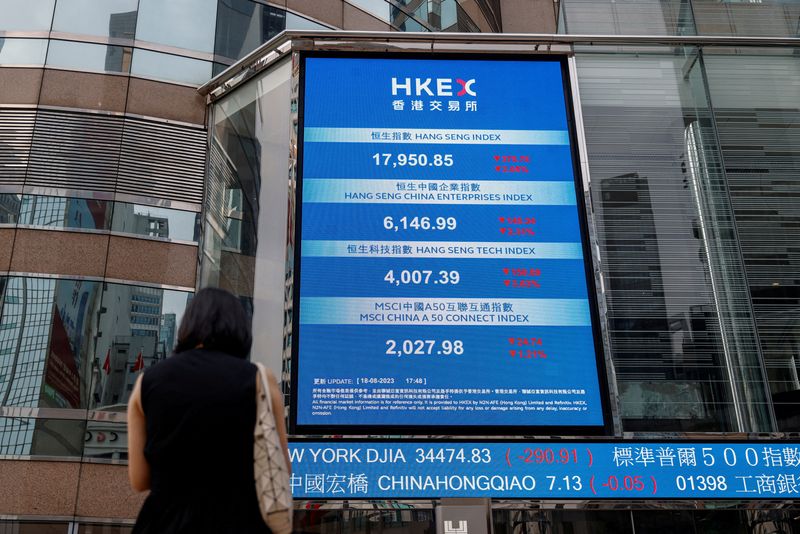By Kane Wu and Scott Murdoch
HONG KONG (Reuters) - Global investment bank and asset manager chiefs are reuniting in Hong Kong next week amid geopolitical tensions and China's economic slowdown, seeking to redefine their position in the world's second-largest economy and its offshore financial hub.
The Global Financial Leaders Investment Summit, a flagship event hosted by the Hong Kong Monetary Authority, begins on Monday with participants including Goldman Sachs Chief Executive David Solomon, Morgan Stanley boss James Gorman, Citigroup's Jane Fraser, as well as HSBC's Noel Quinn and Standard Chartered (OTC:SCBFF)'s Bill Winters.
The heads of Blackstone Group (NYSE:BX), Carlyle Group (NASDAQ:CG), Citadel and others will also speak at the event, which focuses on the main theme of "living with complexity".
The executives are coming to Hong Kong as the city has shed hundreds of banking and asset management jobs because of the slowdown in China dealmaking and the tightened regulatory grip on the market since the inaugural summit last year. That meeting was billed as Hong Kong's comeback as a global financial hub following the disruptions of the COVID-19 pandemic.
"The main question in the mind of everybody when they come to Hong Kong is how is the Chinese economy performing and what would be the swings coming from there," said Diana Parusheva-Lowery, head of public policy and sustainable finance at the Asia Securities Industry & Financial Markets Association in Hong Kong.
The Hong Kong Stock Exchange is only the 11th-largest venue for initial public offerings this year, with merely $2.7 billion raised through the third quarter, a shadow of its top position in most of the last decade. The territory's assets under management fell by 14% in 2022, official data showed.
Trading volumes have also slumped as foreign investors reduce exposure to a China they view as increasingly isolated by its opaque policies, struggling property sector and crackdowns on private enterprise.
"The structural slowdown in China's economy, the omnipresent risk that U.S.-China relations might take another leg down in the future, the questions about whether private mainland money now prefers Singapore, none of that has really changed," said Chris Beddor, Gavekal Dragonomics' deputy China research director based in Hong Kong.
"And senior people in the financial sector are keenly aware of those issues, even if they don't discuss them publicly," Beddor said.
STRING OF LAYOFFS
Hong Kong's financial job market, which saw an exodus of foreign employees during COVID, is unlikely to recover in the near term amid a challenging operating environment, recruiters and industry insiders say.
Goldman Sachs, Morgan Stanley and J.P. Morgan have trimmed dozens of bankers based in Hong Kong and mainland China this year, with key China dealmakers among those laid off.
The surprise merger between Swiss banking rivals UBS and Credit Suisse resulted in a brutal 80% reduction in the Credit Suisse investment banking staff in Hong Kong in August.
Canada's largest pension fund CPP Investments also cut a number of Hong Kong-based staff members.
John Mullally, recruiter Robert Walters' Hong Kong managing director, said hiring in private banking remains active, helped by wealth coming out of China to Hong Kong after the border reopened.

Hong Kong needs to be aware of competition from rival financial hub Singapore but Mullally expects Hong Kong to "regain some of the ground lost" despite the depressed dealmaking and trading.
(This story has been refiled to correct the spelling of CPP Investments in paragraph 13)